-
The “no longer a coincidence” acquisition of several companies
built on category prime generic domain name brands;
advertising.com to AOL, rent.com and shopping.com to
Ebay.
-
The recognition, prime time exposure, and brand platform
commitments by major companies such as Johnson and Johnson to
generic domain names such as baby.com.
-
The significant growth of many companies built on category generic
domain names, companies such as shop.com, drugstore.com,
cars.com,
and binoculars.com to name just a handful of what is amounting to
hundreds.
As
we at Internet Real Estate Group LLC build on our momentum from
2005 and continue to make major acquisitions such as software.com,
and continue to build our portfolio of, and develop, prime
category generic domain names into category portals and profitable
website businesses, we expect to be play a major role in enhancing
asset values for all of us in the industry who are developing top
level generic domain names."
While all of the industry experts we surveyed see more good times
in 2006, Miller and Zapolin always have a back up plan in place.
"There are two hazards we are always on the look out for at
Internet Real Estate Group. Anything as new as the Internet is and
domain names are, which we see as in the womb or second inning,
will experience peaks and valleys. We survived the so-called
bubble and used that period to acquire domain name assets largely
because we expected valleys. We didn’t view it as a bubble as
much as we did a down period before a bigger, better peak. And,
there will be new valleys, hopefully not as deep, followed by
higher peaks."
"We believe that our assets, prime generic domain
names, are going to continue to appreciate for many years, decades
and centuries. The key is to be able to weather the
valleys and use those times as a positive. Our strategy of
operating lean and mean and developing our top level domain names
into businesses that take a longer term look at value than PPC
directories is critical to our vision and allows us to avoid major
hazards and pitfalls."
"With prices always escalating (which we believe will
continue, through peaks and valleys, for many many years) and
inexperienced players coming into the space, it creates even more
of a challenge to create significant asset value and cash flow.
Companies need to evaluate to what level they are capable of
developing a domain name once they acquire it. By creating brands,
hybrid sites that are not just PPC driven, but capable of doing
meaningful sales, attracting sponsors and accelerating value
beyond the general market we protect ourselves from overpaying and
having to sit heavy in equity."
"We further are protected by
surrounding our business with the best minds in the domain and
Internet space and this allows us to quickly evaluate pricing and
development possibilities prior to getting into a competitive
bidding situation. We are excited about 2006 and beyond and
believe we have a portfolio of the marquee properties and
are well positioned to add to the portfolio in 2006," Miller
and Zapolin concluded.
| Development
opportunities have spread far beyond the English speaking world.
26-year-old Matías
de Tezanos (who was featured in our December Cover
Story) built a wildly successful Spanish language network
(ClickDiario.com)
from
scratch and sold it to Japan's LiveDoor in a landmark deal in September. De Tezanos told us, "2005 was
the beginning of the Internet as a big and solid industry in our
market. In past years, the Internet in Latin America hasn't been a
particularly important subject here, but starting with 2005 things
changed a lot. This is impacting our future since now more and
more companies in our region are investing in online advertising
and this means more business to all the people that own domain
names and portals." |
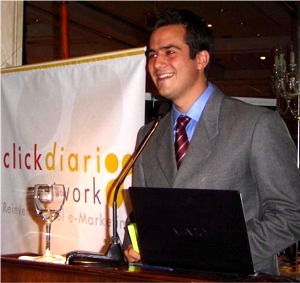
Matías
de Tezanos
CEO,
ClickDiario.com |
Of
course, many domain owners have portfolios that are so large it is
impossible to develop all of their properties. Pay per click
services remain their primary outlet for monetizing their assets.
Every major PPC company currently relies on either Google or Yahoo
to provide the advertising links they display on their parking
pages. Since the riches flow from those two giants, we went back
to Dan Warner, who has dealt extensively with both,
for the latest information on the Internet powerhouses so many
domain owners rely on.
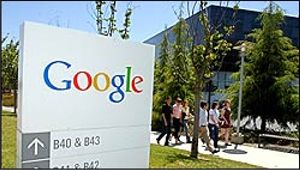 |
"In
2005 Google made staggering progress towards directly
linking the value of a domain portfolio’s traffic and what the
portfolio actually earned with their Smart Pricing index,"
Warner said. "This produced much greater revenue for quality
domains that used their system and penalized other domains which
produced poor quality traffic. This in turn forced a lot of domain
owners with poor quality traffic to follow the revenue and they
subsequently ended up parking their domains with Yahoo! Search."
|
| "This eventuated because at the time the Yahoo systems had much
poorer quality control and therefore paid greater revenue for poor
traffic. Since then, Yahoo!
Search has made some significant inroads into technical
development during 2005. Their technical platform that was
severely lacking in 2004 was given a boost by dedicating large
amounts of money and human resources to their floundering system.
I’m happy to now endorse the Yahoo! systems as being considerably
better than what they were in the previous year and their system
holds a lot of future promise." |
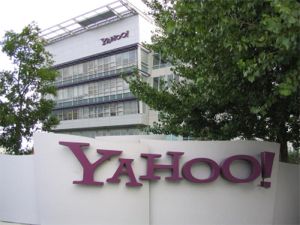 |
"Yahoo! also dedicated themselves in
2005 to building a much more robust system for trademark
infringement protection than what Google now has and they remain
committed to cleaning up their traffic. They also made an honest
effort at implementing a more controlled GEO IP solution that
prevents foreign traffic from being pushed to North American
advertisers via distributed XML feeds by their affiliates, a
significant problem they faced in 2004," Warner said.
"In
2006 I expect Yahoo! will catch up and match Google on a technical
basis barring that Google doesn’t also increase their diligence
to domain research and solutions. Yahoo! has made a sincere
commitment to development that should be supported by the
community. However, I still believe the Google system is
significantly more developed today and will be a challenge to
catch. Yahoo will have to continue to improve their GEO IP
solution and eliminate the remaining holes in affiliate XML feeds
that still send foreign traffic to USA
advertisers. Google now will also be faced with the challenge, for
a change, of catching up with Yahoo! on development related to
trademark identification."
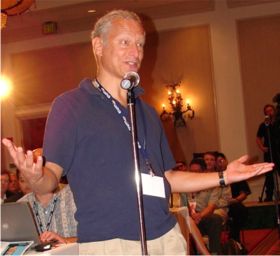
Howard
Hoffman
PPCIncome.com |
The
PPC space is so important that Palo Alto, California domain
investor Howard Hoffman (an M.I.T. graduate and
professional engineer) developed a site at PPCIncome.com to track
performance in the pay per click industry. Hoffman told us, "Higher overall payouts (as measured by
revenue per 1000 unique visitors) would have to be the most significant
development in this space, as this has raised current income for domainers
and the value of domains.
"This has been especially true of the most targetted traffic. Google started their program of paying more or less to their search partners based on the quality of the traffic sent. "Quality", in this case, is based on how well the traffic converts into sales for the advertisers. This has caused their search partners to start paying more or less to domainers for their traffic. This will help reduce click fraud, as fraudulent clicks produce no sales." |
"Another
interesting development was the rise and fall of GoldKey.com, a
parking service that attempted Search Engine Optimization (SEO) on
a massive scale. While it worked for a couple of months, the
two major search engines changed their listing algorithms and sent
the millions of automatically generated extra pages packing. GoldKey continues as a significant parking service, but the amount
of traffic that they monetize and revenue generated is down
sharply from their peak in the early summer. If nothing
else, GoldKey showed many domainers the value of Search Engine
Optimization when it comes time to develop domains," Hoffman
said.
"The other most significant development has been all of the
new companies providing domain parking services. In addition
to GoldKey, Traffic Valet, Dotzup, Parking
Dots, Traffic Club,
Enom, Parking Site and Name Drive all came onto the scene in 2005.
In spite of all of the new players, many of the existing players,
DomainSponsor, Fabulous, Sedo and TrafficZ had major upgrades to
their services during the year. This was responsible for
much of the higher payouts, bringing us full circle and back to
the number 1 development in the space (higher payouts). Competition is really
driving the industry in very healthy ways for all participants,"
Hoffman added.
Asked
for his 2006 forecast, Hoffman said, "There will always be
the potential for some negative unknowns in the domain traffic
monetization (parking) business, however, the future for 2006
looks very bright. Most of the traffic will continue to be
generated by domains owned by a relatively small number of domain
owners, as the existing owners continue to reinvest much of their
profits in expanding their portfolios. Eventually, there will be a
shakeout and a reduction in the number of parking services, but we
are still in a time where there is room for innovation.
Therefore, I do not expect consolidation or a shakeout to start as
early as 2006. I do see room for major improvements in the parking
pages generated and expect the pages to look more interesting and
to generate more revenue," Hoffman concluded.
Indeed,
there has been a long standing debate in the PPC industry as to
whether or not parking pages are more effective if they feature
very simple link-filled layouts or more closely resemble graphic
and content rich website pages.
| Ammar Kubba, the COO at TrafficZ.com
favors the latter approach. "TrafficZ entered 2005 with the goal of
revolutionizing the parked page. We as a community need to wise up and realize that as more and more of the public is exposed to and starts to use direct navigation, they will immediately close out of a page that simply looks like a bunch of links, most of which are not even relevant to what they were looking for. People want pages like
candy.com and
healthcare.cc, pages that look like real websites and deliver relevant
results," Kubba said.
"In 2006, TrafficZ will continue to advance the movement that we championed by adding even more functionality to our best-in-class templating system and by giving the domainers ultimate control over the look, feel and branding of their domain assets.
2006 will finally be the year that Internet advertising becomes an essential part of and permanently ingrained in the global economy. Fortunately, we are all in the right place at the right time. Internet advertising is the present and the future...click fraud, unchecked, is the only thing that can slow or impede our progress, so it is incumbent on the search engines, the parking providers and the domainers to work together to stamp out this phenomenon." |
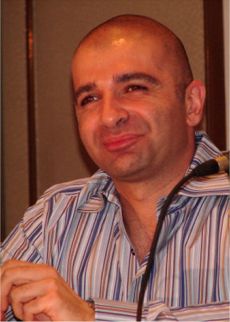
Ammar
Kubba
COO, TrafficZ.com |
Leading
domain attorney Ari Goldberger, who also operates PPC
company SmartName.com,
seconds Kubba's comments. "Our industry faces significant
risks in 2006 from click fraud which we should all work hard to
prevent. Trademark infringing domains also present the risk of
giving a black eye to our business and their use for PPC should be
avoided," Goldberger said.
| "2005
was a good year for SmartName, which experienced
tremendous growth in its partner base, traffic volume, and
revenue. SmartName has focused on being the parking
service for the highest quality domain name portfolios,
offering users numerous templates and the ability to
customize each domain name landing page to maximize
revenue. In 2006, SmartName will continue to focus on
offering domain owners more tools to achieve the goal of
making domain name pages less like billboards and more
like destinations worth stopping by and coming back
to." While Goldberger expects continuing
growth in 2006, he says that very growth in PPC revenue
and domain values will trigger more activity in his role
as an attorney. |
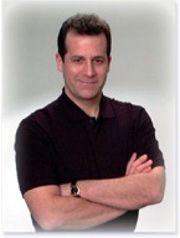
Ari
Goldberger
|
"We
witnessed a big increase in domain name disputes in 2005 as the
increased value of domains justified the associated legal
costs," Goldberger said. "There were also more attempted
reverse domain name hijackings and domain thefts. Domain owners
need to make protection of their domains a primary part of their
business strategy, being careful to avoid collisions with parties
that own trademarks identical or confusingly similar to their
domains. That means being careful to avoid PPC links for products
sold by such trademark owners or their competitors. In 2006, as
ecommerce continues to grow internationally, there will be more
and more disputes of all kinds involving domain names - the real
estate and storefronts of the Internet."
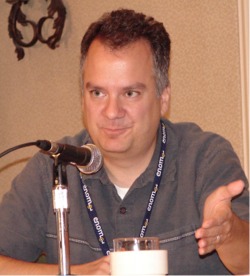
Paul
Stahura
CEO, Enom.com |
As
millions of businesses worldwide come to realize the value of
hanging out their shingle on the web, domain registrations
continue to hit new heights. Paul Stahura, the CEO of
registration giant eNom.com, told us "eNom’s business has
grown remarkably over the past year. We added so many employees
that we are starting to spill over into other floors of our main
building. In 2005 our revenues nearly doubled and profits
continued to be healthy, increasing faster than revenue. We grew
to the 3rd largest registrar in terms of domains under management
by adding over 1.2 million domains in the past year."
"The
domain name marketplace has seen big changes over the past year.
Recent consolidations, leveraged buyouts and acquisitions among
some of the larger players have put all of the large registrars on
notice that big things are happening and I think some of us are
re-evaluating our strategies. I’ve seen a dramatic increase in
interest among equity and other investors in the domain name
industry." |
Looking
to 2006, Stahura said, "I see significant growth in the
Internet advertising (PPC) business, where we have recently been
focusing a lot of energy. My crystal ball is hazy on the future
for the drop game, but probably there will be an increase in
“transfer fulfillment”. Obviously, CLS (Verisign's
proposed Central Listing Service) will be a big factor in that as
well. I have high hopes for new TLD’s such as .eu in Europe, and
I believe that .mobi will have significant potential in the mobile
device market. We are also constantly investing heavily in
building the kind of scalable and flexible technology platform
that can accommodate the growth potential of existing and new
TLD’s around the world and value added services."
|
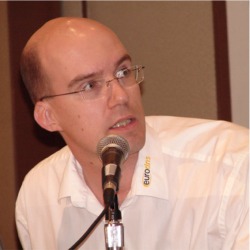
Xavier
Buck
General Manager, EuroDNs.com |
The
new .eu extension Stahura mentioned also has Xavier Buck,
the General Manager of EuroDNS.com
excited. "We think the .eu landrush in April can
impact the whole industry. In the Sunrise we saw already
the strength of this TLD (the latest figures are available
here: http://status.eurid.eu/).
"The
.eu has the strength to become the big deal, even if some
market leaders still do not believe in it. At EuroDNS we
see fast growth of the ccTLDs and the .eu as well as a
lot of movement in the Asian market. Demand for Asian
ccTLDs is growing steadily and 2006 will see terrific
growth in all ccTLDs," Buck said.
America's
country code, .us, enjoyed a breakout in the fourth
quarter of 2005 and finished the year with as many high
dollar sales as .info
and .biz combined. .US wound up taking 11 of the
top 22 positions on DNJournal's 2005 New TLD sales
chart. Massachusetts
real estate attorney Chris Zouzas has always been
among the major investors in .us domains and he saw a lot
to like in 2005. |
"Global
companies are looking to further build their brand in America and
what better way to do that than use .us to target the
market?", Zouzas asked. "Most countries recognize
country codes before other extensions including .com, so in this
sense it is a natural. Within the US it is also working it's way
up the ladder. I think the year's biggest highlight for .us was
Yahoo! buying del.icio.us. The integration of del.icio.us
within the Yahoo! brand starts bringing .us directly into the
American households."
Other
highlights Zouzas cited included Time Magazine picking del.icio.us
as the #1 blog on the web and SheetMusicDirect.us as one of the
top ten music sites. He also liked Volvo's national TV ads for
VolvoCars.us and landing America Magazine as a sponsor for his own
America.us site.
| Zouzas
added, "there was also the purchase of more than $100,000
worth of .us food domains by one company and a huge increase in
the number of .us pages indexed by Google, which grew from 20
million a year ago to 90 million today. Some new sites are also
attracting a huge amount of traffic. ImageShack.us scores over
24,000 with the extension in Overture and
FamilyWatchdog.us is
over 40,000!"
|
 |
With
investors finding something to like in all corners of the domain
business, the competition for good expiring domains has given
companies operating in that sector a huge boost. SnapNames.com
Vice President Mason Cole told us, "SnapNames fared
extremely well in 2005. Our company works with registrars to bring
premium names to market in a stable and predictable way and gives
buyers unprecedented access to high-quality domains. There will
probably be more good times in 2006. There always will be changing
conditions and disputes, but those are part of any business.
Domain names are unique and valuable assets, so the
development of services and opportunities around those assets
should continue to expand."
Taryn
Naidu, the President at Pool.com, thinks the interest
in expiring domains will get another boost from an unexpected
source - new companies entering the PPC space to challenge today's
twin giants. "The stealth antics of the online advertising
industry has reached its pinnacle. Google and Yahoo! have pretty much owned this space, but now
others want a piece of the pie," Naidu said. "MSN,
AskJeeves and Looksmart are just a
few of the major players we'll see make a high-profile bid for
market share."
"New competition coupled with increased "behind the scenes"
media coverage, have armed consumers with the knowledge and know how to
broker better deals. Advertising costs will decrease while the value of
domains will steadily increase," Naidu added. That seeming anomaly could
occur because competition would force PPC providers to give domain
owners a larger share of the pie at the same time advertisers
benefit from lower rates from new outlets seeking their
business.
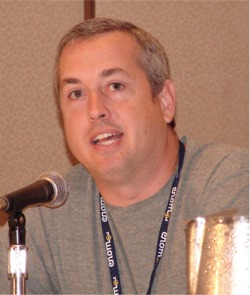
Roger
Collins
President, Afternic.com |
The
major aftermarket sales venues like Sedo.com and Afternic.com
are also reaping major rewards from the domain market boom.
Afternic President Roger Collins told us, "Our business at least doubled in almost every category: domain sales,
parking revenue, number of members, and listings. I have to give most of the credit to our registrar partners. We have been working on
the same strategy for three years: partnering with registrars."
"Even
our $1 million Fish.com sale (the highest reported cash
sale of 2005) resulted from working with a registrar partner. We added eNom in 2005 and look forward to launching another top 10
registrar partnership this quarter. These partners bring us the best
retail/end-user buyers, and our sellers understand the value of this
marketing network. We now have over 1.4 million listings from sellers
serious enough to maintain their paid memberships," Collins
said. |
"For 2006, we are planning for increased Internet advertising to drive
growth in the domain name aftermarket, just as it did in 2005. Parking services seemed to multiply in 2005 and we don’t see a need
for one more. Therefore, we plan to continue relaying the service of
our industry-leading parking providers, Fabulous and Domain Sponsor,
to our members and enhancing their earnings by adding aftermarket
affiliate revenue," Colllins added.
Continue
to Page 3 - Additional Observations & A Visionary's View
Return
to Page 1 (Industry Overview)
|
























